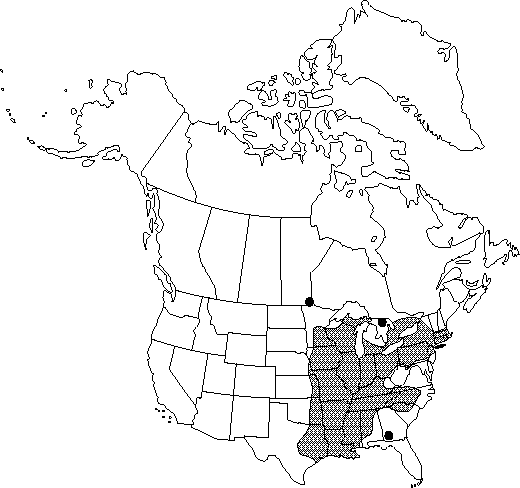Difference between revisions of "Ranunculus fascicularis"
Fl. Boston., 137. 1814.
FNA>Volume Importer |
(No difference)
|
Revision as of 19:50, 26 July 2019
Stems erect or ascending, never rooting nodally, strigose or spreading-strigose, base not bulbous. Roots always both filiform and tuberous on same stem. Basal leaf-blades ovate to broadly ovate in outline, 3-5-foliolate, 2.1-4.7 × 1.9-4.5 cm, leaflets undivided or 1×-lobed or parted, ultimate segments oblanceolate or obovate, margins entire or with few teeth, apex rounded-acute to rounded-obtuse. Flowers: receptacle hispid or glabrous; sepals spreading or sometimes reflexed from base, 5-7 × 2-3 mm, hispid or glabrous; petals 5 (-7), yellow, 8-14 × 3-6 mm. Heads of achenes globose or ovoid, 5-9 × 5-8 mm; achenes 2-2.8 × 1.8-2.2 mm, glabrous, margin forming narrow rib 0.1-0.2 mm wide; beak persistent, filiform, straight, 1.2-2.8 mm. 2n = 32.
Phenology: Flowering winter–spring (Jan–Jun).
Habitat: Grassland or deciduous forest
Elevation: 0-300 m
Distribution

Man., Ont., Ala., Ark., Conn., Ga., Ill., Ind., Iowa, Kans., Ky., La., Md., Mass., Mich., Minn., Miss., Mo., Nebr., N.J., N.Y., N.C., Ohio, Okla., Pa., R.I., S.C., Tenn., Tex., Vt., Va., Wis.
Discussion
Ranunculus fascicularis is very similar to R. hispidus var. hispidus, and herbarium specimens without underground parts may be difficult to identify. Ranunculus fascicularis grows in drier habitats; segments of its leaves are commonly oblanceolate and blunt, with few or no marginal teeth; and its petals are widest at or below the middle. Ranunculus hispidus var. hispidus is usually larger in all its parts (leaves, flowers, heads of achenes); leaf segments are variable in shape but their apices are normally sharper and their marginal teeth more numerous, and petals are widest above the middle.
Selected References
None.